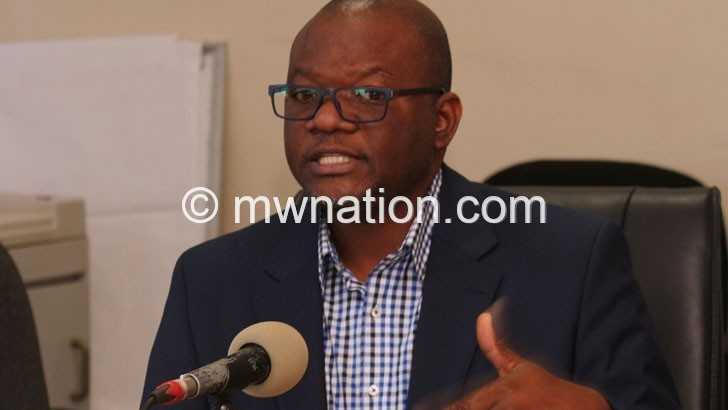Govt moves to seal loopholes
In a bid to seal loopholes and stop theft of public funds, the Malawi Government has moved to tighten screws in the Public Finance Management (PFM) law to make it tough to steal funds.
In an interview yesterday, Solicitor General Reyneck Matemba, who is also view that people will have confidence in the outcome of the whole exercise.

Besides, he said that even politicians can make their inputs by submitting recommendations and views so that they do not hijack the
Ministry of Justice Principal Secretary, confirmed that his ministry was working on a draft Bill targeted for tabling during the next meeting of Parliament set for November.
“We received instructions to amend the law and our target is the November meeting of Parliament. Consultations were done by the owners of the law, Ministry of Finance,” he said.
On his part, Secretary to the Treasury Chauncy Simwaka also confirmed in a separate interview that preparations for the tabling of the Bill were at an advanced stage.

He said: “All pieces of legislation after a period of time need to be reviewed to suit the environment. The Act has been in force for a while and it needed to be reviewed to suit the current environment.
“The Bill is now in the hands of the drafters at Ministry of Justice so I cannot make any comment on the contents, but I can confirm that we consulted widely on the Bill.”
The current PFM Act was passed in 2003 and was amended in 2006, 2010 and 2018.
But despite the modifications, several corruption and abuse of funds scandals still occurred on its watch, including the plunder of public resources at Capital Hill exposed in September 2013 called Cashgate, which prompted a Western diplomat to describe the Malawi Government’s Account Number One as “a leaking bucket”.
While the law provides for punishment of controlling officers, including prosecution where funds are abused, no controlling officer has faced the law despite the National Audit Office (NAO) exposing glaring weaknesses in the management of public resources.
Reacting to the proposed amendment purportedly designed to strengthen the law and PFM, former secretary to the Treasury Ronald Mangani said the law was due for such review as there was no watertight law.
He said: “Every piece of legislation after a period of time needs review. It was passed tighter with Public Audit Act and Public Procurement Act [in 2003], all those have been reviewed and the Public Finance Management Act has been reviewed and critical areas have been raised.”
But Mangani, who is now back at the University of Malawi as associate professor of economics, said a good legislation becomes effective with the right people to implement it.
Malawi Economic Justice Network (Mejn) executive director Bertha Phiri said while her organisation was not among the key stakeholders consulted, it still welcomed the review.
She said: “In general terms, we welcome the action or plan. PFM has to work hand in hand with the situation at hand. As government upgraded Ifmis [Integrated Finance Management and Information System], the legal framework must also speak to that.”
However, in a separate interview, anti-money laundering law expert and special prosecutor for corruption crimes Kamudoni Nyasulu said while a few amendments to the Act were welcome, there was a need for robust implementation of the already existing provisions to stop abuse.
He said: “Let me give the example of the Covid-19 response funds such as the K6.9 billion issue. The [PFM] Act was ignored. The way the audit was conducted… The people audited queried why the issues were raised before they were heard.
“There are few things which need to be strengthened such as disposal of government assets, threshold is too low. Trust money too. Otherwise, the Act is okay.”
Nyasulu, who is also a certified fraud examiner, said successful implementation of laws such as the PFM Act requires accountability institutions to be proactive in ensuring that laws are adhered to.
“For example, the office of DPP [Directorate of Public Prosecutions] and ACB [Anti-corruption Bureau] need to have strategy on what they want to achieve. There can be too many cases and these offices can be too busy, so they need deliberate strategising in wake of absence of enough prosecutors, investigators. We can’t chase any case, we have to prioritise.”
The revised Act is envisaged to be a strong instrument in fighting abuse of public resources, disciplining and prosecuting those who flout its provisions. This suggests that the current framework has failed.
In 2013, the shooting of former Ministry of Finance budget director Paul Mphwiyo exposed revelations of the plunder of public resources at Capital Hill.
Former president Joyce Banda ordered an audit which British forensic auditor, Baker Tilly, undertook covering a randomly chosen six-month period from April to September 2013 and established that about K24 billion was siphoned from public coffers through dubious payments, inflated invoices and goods or services never rendered.
In May 2015, a financial analysis report by audit and business advisory firm PricewaterhouseCoopers (PwC) also established that about K577 billion in public funds could not be reconciled between 2009 and December 31 2014.





